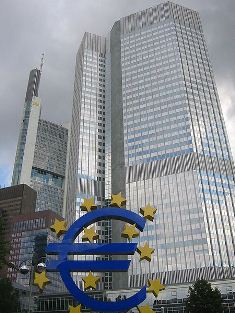 |
BRUSSELS (AP) -- Stocks in Europe and the U.S. remained firm Friday after better than expected U.S. retail sales data helped ease concerns that the world's largest economy is heading back into recession, while a ban on short-selling in several eurozone countries lifted bank shares.
The gains on both sides of the Atlantic followed one of the most volatile weeks in years, as investor sentiment oscillated wildly. At times, investors cheered anti-crisis measures, such as the European Central Bank's decision to support the bonds of Italy and Spain; at others their mood soured amid concerns over the state of the global economy and the exposure of banks to the debt of countries like Greece.
However, as the week progressed, the mood seemed to have calmed somewhat and stock markets in Europe and the U.S. appeared to be heading for further gains Friday.
In Europe, London's FTSE 100 rose 2.3 percent to 5,281, while Germany's DAX was 2.7 percent higher at 5,954. The CAC-40 in France gained 2.8 percent to 3,179, even after data showed the French economy did not grow in the second quarter.
Shares on Wall Street rose after the open, adding to Thursday's big gains - the Dow Jones Industrial Average increased 0.8 percent to 11,232, while the broader Standard & Poor's 500 index was up 0.5 percent at 1,178.
Oil prices also jumped around the $87 dollar a barrel mark having dropped below $80 for a while earlier in the week - a sign of improving investor confidence over global demand.
Sentiment on Friday was lifted after the U.S. Commerce Department said that retail sales rose 0.5 percent last month, the best showing since a 0.8 percent advance in March.
"July retail sales were remarkably buoyant across the board, which speaks volumes for the U.S. consumer's ability to remain resilient in the face of dysfunctional politics in Washington, market disruptions on Wall Street and economic challenges on Main Street," said Michael Woolfolk, managing director at BNY Mellon.
The figures come just a week after the downgrade of the U.S.'s credit rating, which contributed to this week's market turmoil.
The gains in Europe came after regulators in France, Italy, Spain and Belgium imposed temporary bans on short-selling of financial shares late Thursday, following sharp selloffs and temporary gains in French bank shares in particular that were blamed on false rumors. Greece already banned short-selling on Monday.
The share prices of French banks, which fluctuated sharply in recent days, appeared to stabilize Friday, with Societe Generale up 3.9 percent and Credit Agricole gaining 1.8 percent. Belgium's Dexia was doing particularly well, trading 15 percent higher.
However, analysts questioned whether the short-selling ban would be successful in the long run, since many experts claim that a similar move in 2008 actually contributed to investor uncertainty.
Short selling is a way for an investors to bet a stock will go down. It is done by selling borrowed shares in hopes of buying them back at a lower price and pocketing the difference. Regulators in Germany and Britain did not ban the practice Thursday.
"With deteriorating investor confidence in eurozone debt likely to continue driving reduced investor confidence in European banks' ability to withstand the fallout from the euro-zone debt crisis, we doubt that downward pressure on European financials will now dissipate," said Lee Hardman, an analyst at Bank of Tokyo-Mitsubishi UFJ.
The gains in Europe came despite figures showing France's economy unexpectedly ground to a halt in the second quarter on the back of a sudden reversal in consumer spending and stagnation by the country's exporters. France is already facing speculation that it may soon lose its AAA rating due to its high debt load.
Data also showed that Greece's economy shrank 6.9 percent in the second quarter from the year before.
The euro also was seemingly unaffected by the French and Greek data, trading 0.3 percent higher at $1.4250.
Earlier in Asia, the session was far less volatile than of late.
Hong Kong's Hang Seng added 0.1 percent to 19,620.01. Australia's S&P/ASX 200 gained 0.8 percent to 4,237.90, while benchmarks in New Zealand and Singapore also rose.
But Japan's Nikkei 225 stock average was lower - closing down 0.2 percent to 8,963.72 after spending the morning in positive territory. A stronger yen, which reduces the value of profits earned overseas, pummeled export shares.
The dollar is trading around the 76.50 yen mark, which is not far off the levels that prompted the Bank of Japan to intervene directly in the markets to stem the export-sapping appreciation of the yen.
Mainland Chinese shares, however, traded higher for a fourth day, with the absence of bad news helping boost sentiment, traders said. The Shanghai Composite Index gained 0.5 percent to 2,593.17 while the Shenzhen Composite Index gained 1 percent to 1,158.96.
Oil markets rallied after the positive U.S. retail data, with crude rising 85 cents to $86.57 a barrel.
-----
Pamela Sampson in Bangkok contributed to this story.
© 2011 The Associated Press. All rights reserved. This material may not be published, broadcast, rewritten or redistributed. Learn more about our Privacy Policy and Terms of Use.










